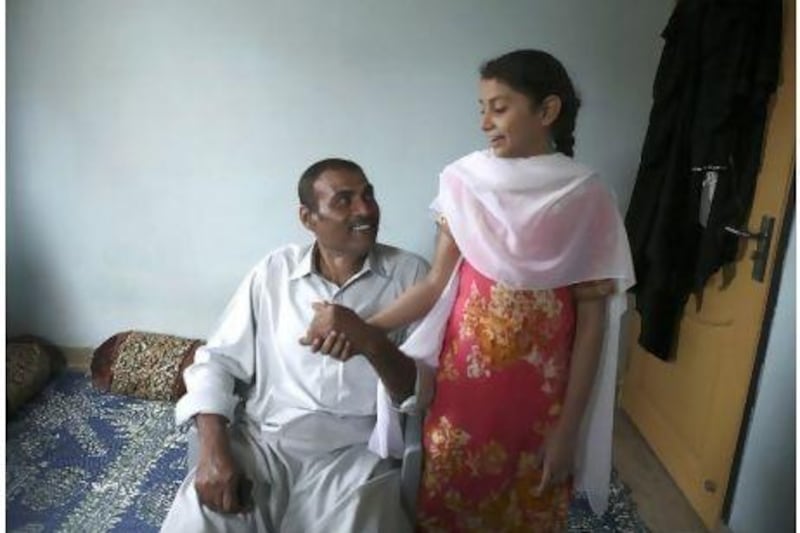KARACHI // Sidra Soomro has missed more than a year of school as a result of her father's captivity aboard the MV Albedo.
The grief over her father's absence was too much to bear and she was kept home.
"Last Eid was so sad," said the 12-year-old yesterday. "But this year there are two Eids: Thursday, when my father returned, and then again at the end of Ramadan."
Less than 24 hours after his release, Faqeer Mohammad Soomro still seemed stunned.
He held his daughter close as he stared out of his drawing room window at the lanes of the dense Lyari neighbourhood humming below.
"When we landed and I stepped out of the airport and smelled the Karachi air, I knew that I finally had my life and my family back," said the 48-year-old sailor.
Mr Soomro described fasting during Ramadan last year aboard the MV Albedo.
"All we had was the rice that the ship had picked up in Karachi, and the pirates would sometimes give us a few potatoes and onions," he said. "All the water on board was dirty, and made us sick regularly."
The crew's ordeal, Mr Soomro said, began at about 7.30am on November 26, 2010. He was brushing his teeth in his bunk when the ship's emergency alarm sounded.
His first thought was that pirates had attacked: for Mr Soomro, it was a familiar feeling.
In 2008, his vessel travelling from Port Qasim, Pakistan, to Somaliland was hijacked near Mogadishu, and he said he was held in the port of Berbera for a year.
The pirates were on-board in a flash and the crew quickly rounded up. "The first pirate on-board was Mohammed Dero, then Ali Anchor," he said, using the pirates' noms de guerre. "Then Al Jabeen, Alex, the two Abbas's and Abdullah. Kelo was the translator."
The most difficult moments to endure for Mr Soomro came many months later when the pirates and Pakistani negotiators were nearing a deal.
He says the pirates were demanding the money be transferred to them before the captives were freed. The Pakistani sailors thought that the pirates wouldn't honour the deal and would just kill them.
"They said, 'our religion is money, we don't care if you're Muslim'," he said. "Who would take care of my two daughters and wife if I died?"
Three months ago, three of the Pakistani sailors were taken to land in Somalia, and survived in remote, harsh conditions with no shelter as the final negotiations took place.
Mr Soomro and the remaining four Pakistanis were brought to land just a week before their release.
"The Indians and Bangladeshis were crying when we left, holding on to us," he said. "They asked us to ask the Pakistani government to put pressure on their governments because no one was helping them."
Finally, the men were driven to Mogadishu and then flew, via Nairobi, to Dubai and then finally, Karachi.
At the Karachi airport the families cried and embraced, as well-wishers threw rose petals. One sailor, Chief Officer Mujtaba, embraced his young son for the first time.
Late on Thursday night, the sailors and their families attended a press conference along with Ahmed Chinoy, chief of the Citizens-Police Liason Committee and lead negotiator for the release of the men.
"It was the most difficult negotiation of my life," said Mr Chinoy.
One day soon Mr Soomro will have to go back out to sea. "I am a sailor, and the pay is better than most jobs here," he said. "But I will not go on a ship routed near Somalia."
Sidra, his daughter, looked up at him: "I will never allow you to go back. I will make you promise."






